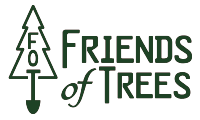5 Questions About Backyard Habitats

So many of our Treemail readers were interested in our Backyard Certification, we wanted to offer more information about how to get certified. Fortunately, we were able to catch up with Gaylen Beatty, who founded the program in 2006 while working for Columbia Land Trust, today works closely with their partner, Audubon Society of Portland to assist the 2,700+ participants in the program. Gaylen was kind enough to go into greater detail via email about the certification process.
How long does the certification process take?
On average, it takes someone a year from the initial site visit to achieve certification. Though we support the participant for however long it takes them to achieve certification. We have many participants, who have some more difficult properties (erosion, a complex mix of invasive plants, large property) that take years to achieve certification. We have over 60% of those properties once they initially enroll that stick with the program and process to make certification.
How much does the certification process cost?
Feb 1st, we’re increasing the site visit fee to $35. That fee pays for the entire process and for the length of the time the property is within Backyard. No renewal fee for any follow up visits (certification or recertification).
What is the advantage of backyard certification?
Research is showing that even small urban lots can provide a great habitat and support biodiversity in our region. Did you know of the 500 bird species found in Oregon, 209 of those are found in the Portland-Metropolitan area for some portion of their lifecycle? Many of our participants also have some sort of food production in their garden, from vegetables to fruit trees. Providing native plants that support our native pollinators can help increase food production, even on a small lot. Having a Backyard sign in your garden, teaches neighbors, friends, etc. that you can have a beautiful garden that creates a healthy urban landscape, for people and wildlife.
How do certifications help individuals?
Our participants share stories with us almost daily on the change they’ve seen in their backyard, by making small changes in their garden to support wildlife. Here’s a quote from an email that came in earlier this week from a gold certified homeowner, “This past weekend I was in our kitchen and noticed a small creature rummaging around in the backyard in some bushes under our pine tree and Ribes. I thought at first it was just a squirrel then I noticed a bright flash of orange. I ran and got our binoculars. It was a new bird to me! I looked it up and found out it is a Varied Thrush. True it may be a common bird, but not to me. I have always maintained to more of a plant person than a bird person in my habitat work. However, the feeling of discovering a new, exciting bird in my yard gave me such a thrill. I was so proud of active “Backyard Habitat”! Just thought I’d share.”
There are over 1,000 certified homes in the Portland area, how common is it for a business to get certified?
There are 14 commercial spaces that are enrolled in Backyard Habitat. We only have four properties that are Platinum certified. Those include Green Zebra grocery store in Kenton, EMSWCD office, Apex Wellness Center and Friends Of Trees. You all fall into a small, exclusive group that showcase how an urban commercial lot can be beautiful and SO valuable for wildlife. I’d strongly encourage commercial spaces to challenge themselves to look beyond the common ornamental landscapes and become a model for what our small handful of commercial spaces have already done.
